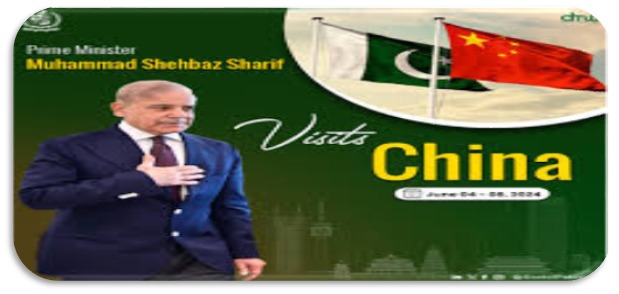THE SILENT SUPERPOWER OF THE 21ST CENTURY: PAKISTAN’S ECONOMIC REVOLUTION AND EDUCATIONAL RENEWAL
Dr. Muhammad Shahzad Ashfaq
Post-Doctorate (Peace Education)
International Islamic University Islamabad – Pakistan
In the 21st century, as the world navigates through rapid technological advancements and globalization, Pakistan has emerged as an unexpected silent superpower. The richest country in the world famous for his hospitality making significant strides in economic development and educational renewal. Transformative journey of Pakistan, shedding light on its economic revolution and educational resurgence that has positioned the country as a potential powerhouse in the global arena. Pakistan once plagued by economic instability and challenges has witnessed a remarkable turnaround in recent years. The country’s economic revolution are attributed to a combination of strategic policies, investments and reforms.
One key driver of this revolution is the Pakistan-China Economic Corridor (CPEC), a multi-billion dollar infrastructure project that aims to connect China’s western region to Pakistan’s Gwadar Port. The project has not only boosted Pakistan’s infrastructure but has also catalyzed economic growth through job creation, industrial development and enhanced trade opportunities. Moreover, Pakistan’s focus on enhancing its exports and promoting foreign investment that contributes significantly into its economic renewal. The government initiatives to improve ease of doing business, attract foreign direct investment and foster entrepreneurship that creates a conducive environment for economic growth.
Pakistan a country of rich culture has also diversified its export base, focusing on sectors like textiles, agriculture and IT services which have shown promising growth potential in global market. Additionally, Pakistan’s agriculture sector a vital component of its economy has witnessed modernization and technological advancements. The adoption of precision agriculture techniques improved irrigation systems and crops diversification that increased agricultural productivity but have also enhanced farmer’s livelihood. The government supports for the agriculture sector by providing subsidies, access to credit and agricultural extension services to further accelerated its growth.
Alongside its economic revolution, Pakistan has also embarked on a journey of educational renewal aiming to improve access to quality education for its citizens. Pakistan has long faced challenges in its education system, including issues of access, quality and equity. In recent years there has been a strong push towards educational renewal in the country. This renewed focus on education at a crucial time when Pakistan experiencing rapid economic growth and development. Pakistan aims to equip its citizens with the knowledge and skills needed to contribute effectively to the economy and society.
One of the key initiatives in Pakistan’s educational renewal journey is the Prime Minister Laptop Scheme. The aim of (PMLS) is to attach its youth towards modern knowledge about significant reforms in education sector such as development, teacher training and educational infrastructure. This policy shift emphasizes the importance of enhancing the quality of education, promoting skill development and ensuring inclusivity in the education system.
Pakistan strength is to create a more robust and responsive education system that meets the needs of 21st century. In policy reforms Pakistan has been investing in improving its educational infrastructure. The government has allocated a significant portion of its budget to the education sector with a focus on building new schools, upgrading existing facilities and improve quality of education in the country. Pakistan is laying the foundation for a brighter future for its citizens and the nation as a whole.
Education is often as the cornerstone of development, as it equips individuals with the knowledge and skills to thrive in a rapidly evolving world. Pakistan has been actively investing in its educational and economic growth to provide quality in education and its products. Pakistan focus on building new schools and upgrading existing institutions for its population.
The government of Pakistan is fully committed to reforms in educational sector by significant allocation of funds. World Bank report (2020), the government of Pakistan allocated 2.4% of its GDP to education demonstrating a clear prioritization of this crucial sector. This investment is crucial for building new schools, upgrading facilities and ensuring that all children have access to quality education.
Investing in education infrastructure is a strategic move that helps to collect significant benefits for Pakistan. In education sector, constructing new schools especially in underserved areas the government increase access to education for children who previously had limited or no opportunities. This expansion of education is crucial for promoting inclusivity in all the segments of society and access to learning resources. Moreover, upgrading existing educational institutions is essential for enhancing the quality of education. Pakistan can improve and upgrade the learning experience for students that enables to attract talented educators to contribute in the global knowledge economy.
Pakistan stands at a critical juncture where improving and upgrading the learning experience for students is essential for attracting talented educators. In an era characterized by rapid globalization and technological advancement, the educational landscape must evolve to meet contemporary demands. Incorporating innovative teaching methodologies, enhancing curricula, and leveraging technology, Pakistan can create an engaging learning environment that not only nurtures student potential but also draws skilled educators from around the globe.
The integration of modern pedagogical approaches, such as project-based learning and collaborative techniques, can significantly enhance student engagement. Furthermore, investing in digital infrastructure will facilitate access to online resources and global knowledge networks. This transformation is pivotal in cultivating a culture of continuous learning among students, thereby preparing them to contribute effectively to the global knowledge economy.
Moreover, fostering partnerships with international educational institutions can provide Pakistani educators with exposure to best practices in teaching and curriculum development. These improvements in education, Pakistan can significantly contribute to the global knowledge economy while empowering its youth with the skills necessary to thrive in an increasingly interconnected world. Such collaborations will not only elevate local standards but also position Pakistan as an attractive destination for knowledgeable professionals seeking impactful careers in education.



